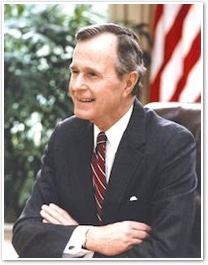Last of the greatest generation to serve
- FATHER RAYMOND J. DE SOUZA
The statesman he became outside the home was never more important than the father he was inside it.
 He is remembered as a foreign policy president — vanquisher of Saddam in the first Gulf War, magnanimous steward at the end of the Cold War. Vast empires often disintegrate in upheavals and war; his steady hand kept the peace.
He is remembered as a foreign policy president — vanquisher of Saddam in the first Gulf War, magnanimous steward at the end of the Cold War. Vast empires often disintegrate in upheavals and war; his steady hand kept the peace.
But George Herbert Walker Bush was best at home. Not domestic policy, but at home — as a man of faith, family and fatherhood. The election of his son, George W. Bush, made George H.W. Bush into something of a "first father" — a grandfather to a nation that profoundly needed the witness of fathers and sons.
It turned out that in the 1980s, when the bright lights of stardom and celebrity shone around Bill Cosby as America's Dad — complete with a bestselling book entitled "Fatherhood" — the real model of fatherhood was the slightly old-fashioned, not at all glamorous man serving as vice-president.
When George H.W. Bush died on Friday in Houston, seven months after his wife of 73 years, Barbara, he was remembered as a president, a war hero, the last of the greatest generation. True enough. But who he was, more than what he did, was more important.
Longtime political broadcaster Chris Wallace described him as "the greatest living American" and confessed that, like so many others — including Bill Clinton, the man who dealt him his most bitter political defeat — he "loved him." No one thought that surprising, or its confession out of place.
Bush 41 — as his own family called him, to distinguish the 41st president from his son, the 43rd president — was a son of what would now be called the 1 per cent. His grandfather and father were wealthy Wall Street financiers, the latter becoming a senator from Connecticut.
Both served as presidents of the United States Golf Association, the kind of thing one would expect from an elite New England family that had a summer compound at Walker's Point in Kennebunkport, Maine, the very land named after his family's maternal side.
Bush was born wealthy and powerful — with a "silver foot in his mouth" as the irrepressible Ann Richards put it at the Democratic National Convention in 1988.
That line alone made her famous enough to get elected governor of Texas.
But Bush got his revenge, when George W. defeated her in 1994, on his way to succeed Clinton in 2000.
Yet as a teenager, Bush decided that he would not use his privilege to protect or promote himself. On his 18th birthday in 1942 he enlisted in the navy, six months after Pearl Harbor. The youngest pilot in the navy, he flew combat missions in the Pacific, getting shot down in September 1944. He was in the ocean for three hours before being rescued. Two of his crew mates were killed.
Returning home a war hero, he married Barbara Pierce, while completing his degree at Yale.
The secret of their long and happy marriage? "Both of us have always been willing to go three-quarters of the way," said Barbara. Halfway is a compromise; three quarters is to sacrifice.
The decision to enlist was followed by another decision, in some sense more radical. Bush grew up in Greenwich, Conn., one of the richest cities in the United States. He went to elite schools where students were often dropped off by chauffeur. But he decided to go west after graduation, turning down offers to join the Wall Street world of his father and grandfather.
He moved to the desert of west Texas with his young wife and first-born son to learn the oilpatch.
No son of the Walker and Bush clans could be an entirely self-made man.
But George would try. The first Bush home in Odessa, Tex., was a duplex that had its own bathroom; most of the houses on the street had outhouses. The Bushes shared that bathroom with the women who occupied the other half of the duplex. They were prostitutes.
A successful entrepreneur in the oil business, he moved to Houston where he would begin his political career.
His father was a New England Republican; Bush was a Republican in 1950s Texas, where no Republican had been elected to statewide office since the Civil War. The careers of 41 and 43 tracked the transformation of American politics, where the Republicans lost the northeast and won the south.
In Texas, he lost a Senate campaign before twice winning election to the House of Representatives. Seeking counsel from LBJ about whether he should try again for the Senate, the former president from Texas told him, "The difference between the Senate and the House is the difference between chicken salad and chicken shit."
So Bush tried again for the Senate and lost. He was appointed to several senior roles — UN ambassador, American representative in Beijing, Republican party chairman, CIA director — before running for president himself in 1980. He lost the nomination to Ronald Reagan, but served as his vicepresident for eight years.
He was drawn into the Reagan magic. Since the Second World War, American presidential politics has followed a strict rule. Each party wins two consecutive presidential elections, and the other party does the same. The rule has endured through assassination and resignation.
The only deviation was Reagan, who defeated a oneterm president, Jimmy Carter, and handed over office to his own vice-president. The great good luck of Bush 41's life was not his pedigree, but that he was chosen by Reagan to be his deputy.
He was not the best president America ever had, but he was likely the best man to serve as president.
Bush lived the life Reagan eulogized as that of the quintessential American — patriotic, pious and devoted to family. He married young and had happy and successful children. Late in life his greatest boast was that all his children still loved to come home.
His post-presidential life was dominated by his sons, George W. and Jeb, the latter a two-term governor of Florida who ran against Donald Trump in 2016 for the presidential nomination.
And a remarkable relationship developed with Clinton. Clinton's father had died in a car accident three months before he was born; his own family life would not follow the wholesome Bush model. He came to see 41 as a father figure, visiting so often that he came to call himself the "black sheep of the Bush family."
Bush decided not to write a presidential memoir. But 43 wrote one instead, entitled "41: A Portrait of My Father." He explains in that 2014 book why 41 might not have chosen to write about himself at length.
"Dorothy Walker Bush (41's mother) was a woman of strong faith," he wrote.
"She read Bible verses to her children over breakfast every morning. One of her favourite passages was Proverbs 27:2: 'Let another man praise thee, and not thine own mouth.' "
Bush 41 managed to live a life of great ambition — without which no one becomes president — and yet remain true to what his mother taught him as a child.
He was loath to speak of himself, but eager to talk of his family.
The statesman he became outside the home was never more important than the father he was inside it.
And for that reason, those other men of Proverbs 27 are praising him now.
 This is Meaghen Gonzalez, Editor of CERC. I hope you appreciated this piece. We curate these articles especially for believers like you.
This is Meaghen Gonzalez, Editor of CERC. I hope you appreciated this piece. We curate these articles especially for believers like you.
Please show your appreciation by making a $3 donation. CERC is entirely reader supported.

Acknowledgement
 Father Raymond J. de Souza, "Last of the greatest generation to serve." National Post (December 4, 2018).
Father Raymond J. de Souza, "Last of the greatest generation to serve." National Post (December 4, 2018).
Reprinted by permission of the National Post.
The Author
Father Raymond J. de Souza is the founding editor of Convivium magazine.
Copyright © 2018 National Post



